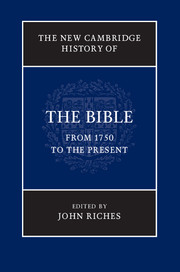Book contents
- The New Cambridge History of THE BIBLE
- Series page
- The New Cambridge History of THE BIBLE
- Copyright page
- Contents
- Figures
- Contributors
- Preface
- Abbreviations
- Introduction
- Part I Producing the Text
- Part II New Modes of Study of the Bible
- 4 The History of Religions School
- 5 The archaeological study of the Bible
- 6 Source, form, redaction and literary criticism of the Bible
- 7 Social-scientific readings of the Bible
- 8 Reception history of the Bible
- 9 The uses of the Bible in theology
- 10 Idealist/Hegelian readings of the Bible
- 11 Liberal readings of the Bible and their conservative responses
- 12 The use of the Bible in dialectical theology
- 13 Existential(ist) interpretation of the New Testament
- 14 Liberationist readings of the Bible
- 15 Feminist readings of the Bible
- 16 Post-colonial readings of the Bible
- 17 Jewish readings of the Bible
- 18 The Bible in philosophy and hermeneutics
- 19 Fundamentalist readings of the Bible
- Part III Reception of the Bible Geographically
- Part IV Reception of the Bible Confessionally
- Part V Thematic Overview: Reception and Use of the Bible, 1750–2000
- Conclusion
- Select bibliography
- Index of biblical manuscripts
- Index of scriptural sources
- General index
6 - Source, form, redaction and literary criticism of the Bible
from Part II - New Modes of Study of the Bible
Published online by Cambridge University Press: 09 June 2015
- The New Cambridge History of THE BIBLE
- Series page
- The New Cambridge History of THE BIBLE
- Copyright page
- Contents
- Figures
- Contributors
- Preface
- Abbreviations
- Introduction
- Part I Producing the Text
- Part II New Modes of Study of the Bible
- 4 The History of Religions School
- 5 The archaeological study of the Bible
- 6 Source, form, redaction and literary criticism of the Bible
- 7 Social-scientific readings of the Bible
- 8 Reception history of the Bible
- 9 The uses of the Bible in theology
- 10 Idealist/Hegelian readings of the Bible
- 11 Liberal readings of the Bible and their conservative responses
- 12 The use of the Bible in dialectical theology
- 13 Existential(ist) interpretation of the New Testament
- 14 Liberationist readings of the Bible
- 15 Feminist readings of the Bible
- 16 Post-colonial readings of the Bible
- 17 Jewish readings of the Bible
- 18 The Bible in philosophy and hermeneutics
- 19 Fundamentalist readings of the Bible
- Part III Reception of the Bible Geographically
- Part IV Reception of the Bible Confessionally
- Part V Thematic Overview: Reception and Use of the Bible, 1750–2000
- Conclusion
- Select bibliography
- Index of biblical manuscripts
- Index of scriptural sources
- General index
Summary
- Type
- Chapter
- Information
- The New Cambridge History of the Bible , pp. 149 - 159Publisher: Cambridge University PressPrint publication year: 2015



